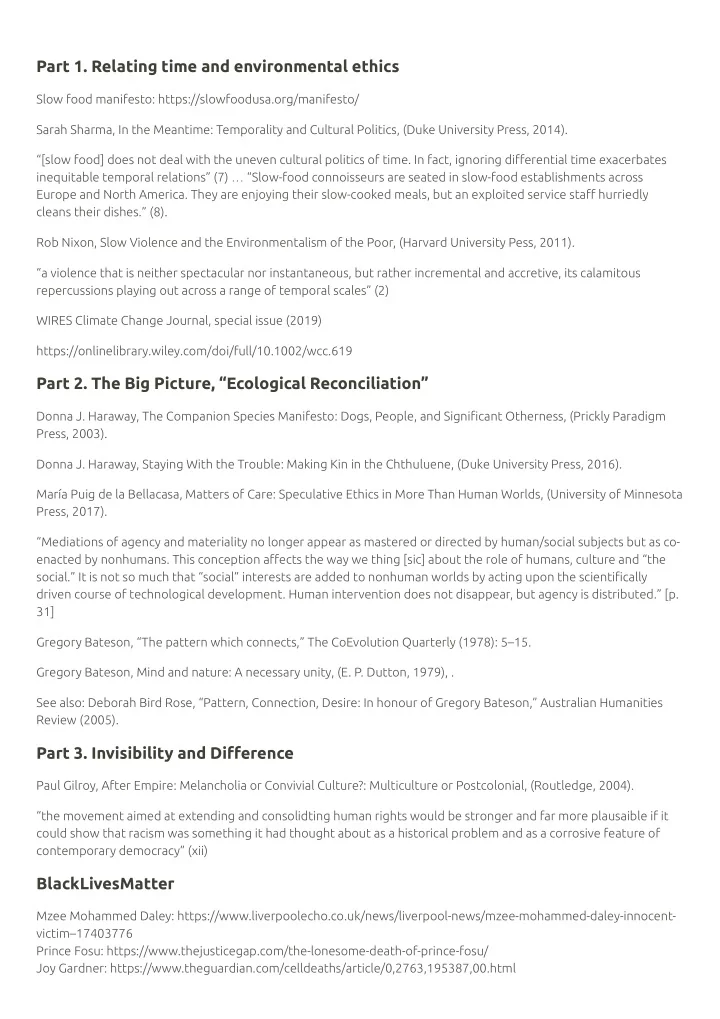

Part 1. Relating time and environmental ethics Slow food manifesto: https://slowfoodusa.org/manifesto/ Sarah Sharma, In the Meantime: Temporality and Cultural Politics, (Duke University Press, 2014). “[slow food] does not deal with the uneven cultural politics of time. In fact, ignoring differential time exacerbates inequitable temporal relations” (7) … “Slow-food connoisseurs are seated in slow-food establishments across Europe and North America. They are enjoying their slow-cooked meals, but an exploited service staff hurriedly cleans their dishes.” (8). Rob Nixon, Slow Violence and the Environmentalism of the Poor, (Harvard University Pess, 2011). “a violence that is neither spectacular nor instantaneous, but rather incremental and accretive, its calamitous repercussions playing out across a range of temporal scales” (2) WIRES Climate Change Journal, special issue (2019) https://onlinelibrary.wiley.com/doi/full/10.1002/wcc.619 Part 2. The Big Picture, “Ecological Reconciliation” Donna J. Haraway, The Companion Species Manifesto: Dogs, People, and Significant Otherness, (Prickly Paradigm Press, 2003). Donna J. Haraway, Staying With the Trouble: Making Kin in the Chthuluene, (Duke University Press, 2016). María Puig de la Bellacasa, Matters of Care: Speculative Ethics in More Than Human Worlds, (University of Minnesota Press, 2017). “Mediations of agency and materiality no longer appear as mastered or directed by human/social subjects but as co- enacted by nonhumans. This conception affects the way we thing [sic] about the role of humans, culture and “the social.” It is not so much that “social” interests are added to nonhuman worlds by acting upon the scientifically driven course of technological development. Human intervention does not disappear, but agency is distributed.” [p. 31] Gregory Bateson, “The pattern which connects,” The CoEvolution Quarterly (1978): 5–15. Gregory Bateson, Mind and nature: A necessary unity, (E. P. Dutton, 1979), . See also: Deborah Bird Rose, “Pattern, Connection, Desire: In honour of Gregory Bateson,” Australian Humanities Review (2005). Part 3. Invisibility and Difference Paul Gilroy, After Empire: Melancholia or Convivial Culture?: Multiculture or Postcolonial, (Routledge, 2004). “the movement aimed at extending and consolidting human rights would be stronger and far more plausaible if it could show that racism was something it had thought about as a historical problem and as a corrosive feature of contemporary democracy” (xii) BlackLivesMatter Mzee Mohammed Daley: https://www.liverpoolecho.co.uk/news/liverpool-news/mzee-mohammed-daley-innocent- victim–17403776 Prince Fosu: https://www.thejusticegap.com/the-lonesome-death-of-prince-fosu/ Joy Gardner: https://www.theguardian.com/celldeaths/article/0,2763,195387,00.html
For more good material on anti-racism, see here: - Justice in June: https://docs.google.com/document/d/1H-Vxs6jEUByXylMS2BjGH1kQ7mEuZnHpPSs1Bpaqmw0/ - https://daily.jstor.org/institutionalized-racism-a-syllabus/ - Black feminist perspectives on Covid–19, a reading list: https://www.blackwomenradicals.com/blog-feed/black- feminist-perspectives-on-covid–19-a-reading-list For data on institutional racism in the UK, see: https://www.theguardian.com/commentisfree/2017/sep/08/david-lammy-review-bame-children-face-prejudice- flawed-criminal-justice-system “Data disclosed by the Metropolitan Police in London in August 2017 found that people of African descent and of ethnic minority background, in particular young African and Caribbean men, subject to deadly use of force by restraint and restraint equipment, were twice as likely to die after the use of force by police officers and the subsequent lack or insufficiency of access to appropriate healthcare.” https://www.ohchr.org/EN/NewsEvents/Pages/DisplayNews.aspx?NewsID=22997 “Between 27 March to 11 May Black, Asian and minority ethnic people in England were 54% more likely to be fined under coronavirus rules than white people. And the recent Public Health England (PHE) review confirms that the risk of dying among those diagnosed with Covid–19 is higher in those in BAME groups than in white ethnic groups by 50–200%.” To de-colonise your music collection: https://docs.google.com/spreadsheets/d/1OIUBp4kFxmpWJihhq6WLwJQR1Am4DsD59bEYlJZxeGY/ To learn about the amazing work of POC in the UK over the past century, see: https://blackculturalarchives.org And some great stuff for homeschoolers here: https://windrushfoundation.com/70-windrush-pioneers-and- champions-empire-windrush-education-resource/ Scholarship by Dorceta Taylor uncovered an overwhelmingly white “Green Insiders’ Club.” - https://www.diversegreen.org/the-challenge/, See also https://seas.umich.edu/research/faculty/dorceta-e-taylor). Val Plumwood, Environmental culture : the ecological crisis of reason, (Routledge, 2002). Part 4. Wrap-up Sonya Posmentier, Cultivation and Catastrophe: The Lyric Ecology of Modern Black Literature, (Johns Hopkins University Press, 2017). For more on black eco-poetics, see the fantastic anthology by Camille T. Dungy “Black Nature: Four Centuries of African American Nature Poetry”: www.ugapress.org/index.php/books/black_nature Édouard Glissant, “The quarrel with history” https://www.newframe.com/from-the-archive-the-quarrel-with-history/ If it is ridiculous to claim that a people “has no history” … because the lived circumstances of this daily reality do not form part of a continuum, which means that its relation with its surroundings (what we would call its nature) is in a discontinuous relation to its accumulation of experiences (what we would call its culture). In such a context, history as far as it is a discipline and claims to clarify the reality lived by this people, will suffer from a serious epistemological deficiency: it will not know how to make the link. The problem faced by collective consciousness makes a creative approach necessary, in that the rigid demands made by the historical approach can constitute, if they are not restrained, a paralysing handicap. Methodologies passively assimilated, far from reinforcing a global consciousness or permitting the historical process to be established beyond the ruptures experienced, will simply contribute to worsening the problem.
The French Caribbean is the site of a history characterised by ruptures and that began with a brutal dislocation, the slave trade. Our historical consciousness could not be deposited gradually and continuously like sediment, as it were, as happened with those peoples who have frequently produced a totalitarian philosophy of history, for instance, European peoples, but came together in the context of shock, contraction, painful negation and explosive forces. This dislocation of the continuum, and the inability of the collective consciousness to absorb it aIl, characterise what I call a nonhistory. In response to Edward Baugh, “The West Indian Writer and His Quarrel with History” https://muse.jhu.edu/article/483217/pdf cf: https://birmingham- primo.hosted.exlibrisgroup.com/permalink/f/19a9mc5/TN_cdi_crossref_primary_10_1215_07990537_1665677
Recommend
More recommend